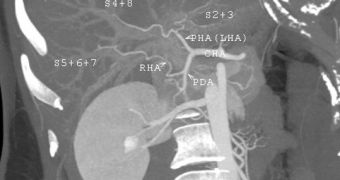Experts with the EUREKA project Odysseus announce that they have just finished developing a new tool aimed at making it easier for surgeons to conduct complex liver surgeries. The same method is bound to benefit the patients as well, as they ultimately stand to gain or lose from the experience, or lack thereof, of their surgeons. The new tool reportedly advances healthcare experts' understanding of how the human liver is segmented, by generating an accurate, 3D representation of the blood vessels within one of the human body's major organs, AlphaGalileo reports.
The method revolves around using a software to combine pieces of data collected via Magnetic Resonance Imaging (MRI) and computed tomography (CT) scans. The datasets can then be transmitted to any consultants anywhere in the world, and the course of the operation can be established while the procedures are ongoing (in real-time), or shortly before the patient is placed on the operating table. The best possible diagnostic support, as well as the best informed collaborative decisions thus become possible, potentially increasing a patient's chances of pulling through complex procedures.
The tool also allows for the simulation of laparoscopic and robotic surgery, which could prove invaluable for training future generations of surgeons. Aspects such as tissue resistance are also factored into the simulation, which means that those practicing on it will get as close to the real deal as possible without actually touching a live liver. “Thanks to the 3D modeling, the future of liver surgery has gained more precision through accurate definition of the liver's blood vessels,” Institut de Recherche pour les Cancers de l'Appareil Digestif (IRCAD) researcher, Professor Luc Soler says.
The new simulation, Virtual Patient Modeling (VR-Anat, formerly known as 3D-VPM), makes use of data that is specific to a certain patient. As it operates on more and more people, each generation of surgeons begins to realize that individual livers are very different from the textbook descriptions. This can translate into flops in the operating room that have nothing to do with a doctor's level of preparation and skill. The tool was developed by IRCAD, in collaboration with the French Institut National de Recherche en Informatique et Automatique (INRIA). It has already been tested in five hospitals in France, Switzerland and Canada.

 14 DAY TRIAL //
14 DAY TRIAL //